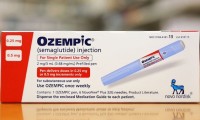-
Novo Nordisk’s new anchor
- Source: drugdu
- 58
- September 20, 2024
-
Will Novo Nordisk’s Wegovy follow up with the price reduction of over 50% for Eli Lilly’s Zepbound?
- Source: drugdu
- 75
- September 4, 2024
-
FDA Says ‘No’ to Novo Nordisk’s Once-Weekly Insulin
- Source: drugdu
- 99
- July 16, 2024
-
After AdCom rejection, FDA rebuffs Novo Nordisk’s once-weekly insulin
- Source: drugdu
- 94
- July 13, 2024
-
Novo Nordisk’s Awiqli receives CHMP recommendation to treat diabetes in adults
- Source: drugdu
- 92
- March 27, 2024
-
Reuters
- Source: drugdu
- 160
- January 26, 2024
-
Novo Nordisk, Eli Lilly’s weight-loss drugs under FDA scrutiny for suicidal thoughts, hair loss
- Source: drugdu
- 89
- January 6, 2024
-
In $92.5M deal, Alkermes hands the keys to Ireland manufacturing plant to Novo Nordisk
- Source: drugdu
- 99
- December 17, 2023
-
With FDA approval, Eli Lilly’s weight-loss drug Zepbound arrives to challenge Novo Nordisk
- Source: drugdu
- 102
- November 10, 2023
-
Novo Nordisk, Valo Health Partner to Develop Treatments for Cardiometabolic Diseases
- Source: drugdu
- 121
- October 6, 2023
your submission has already been received.
OK
Subscribe
Please enter a valid Email address!
Submit
The most relevant industry news & insight will be sent to you every two weeks.













